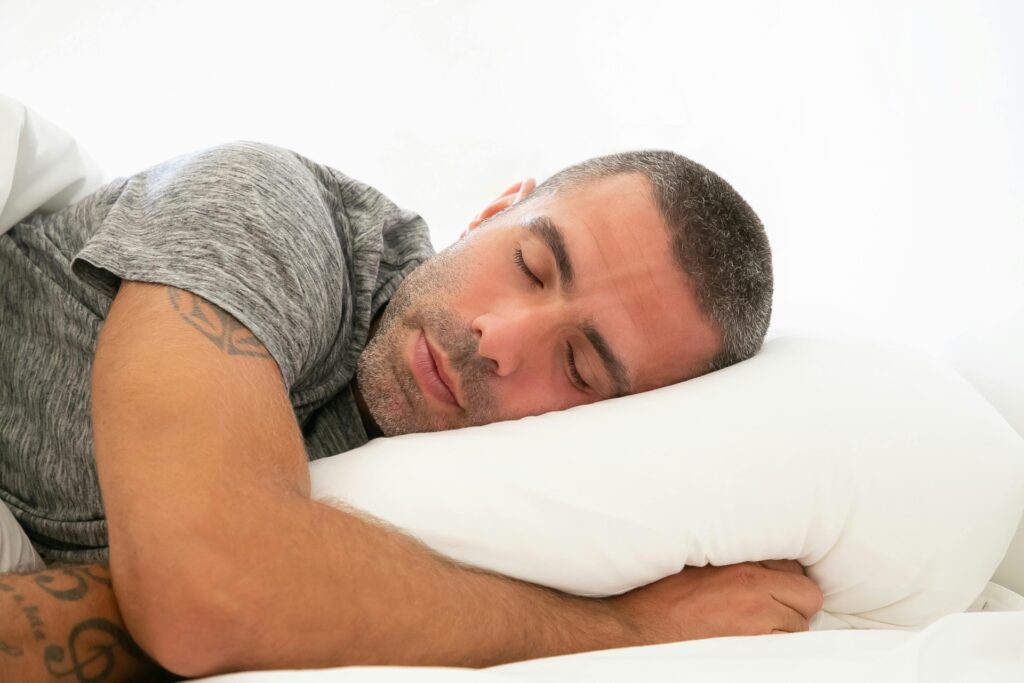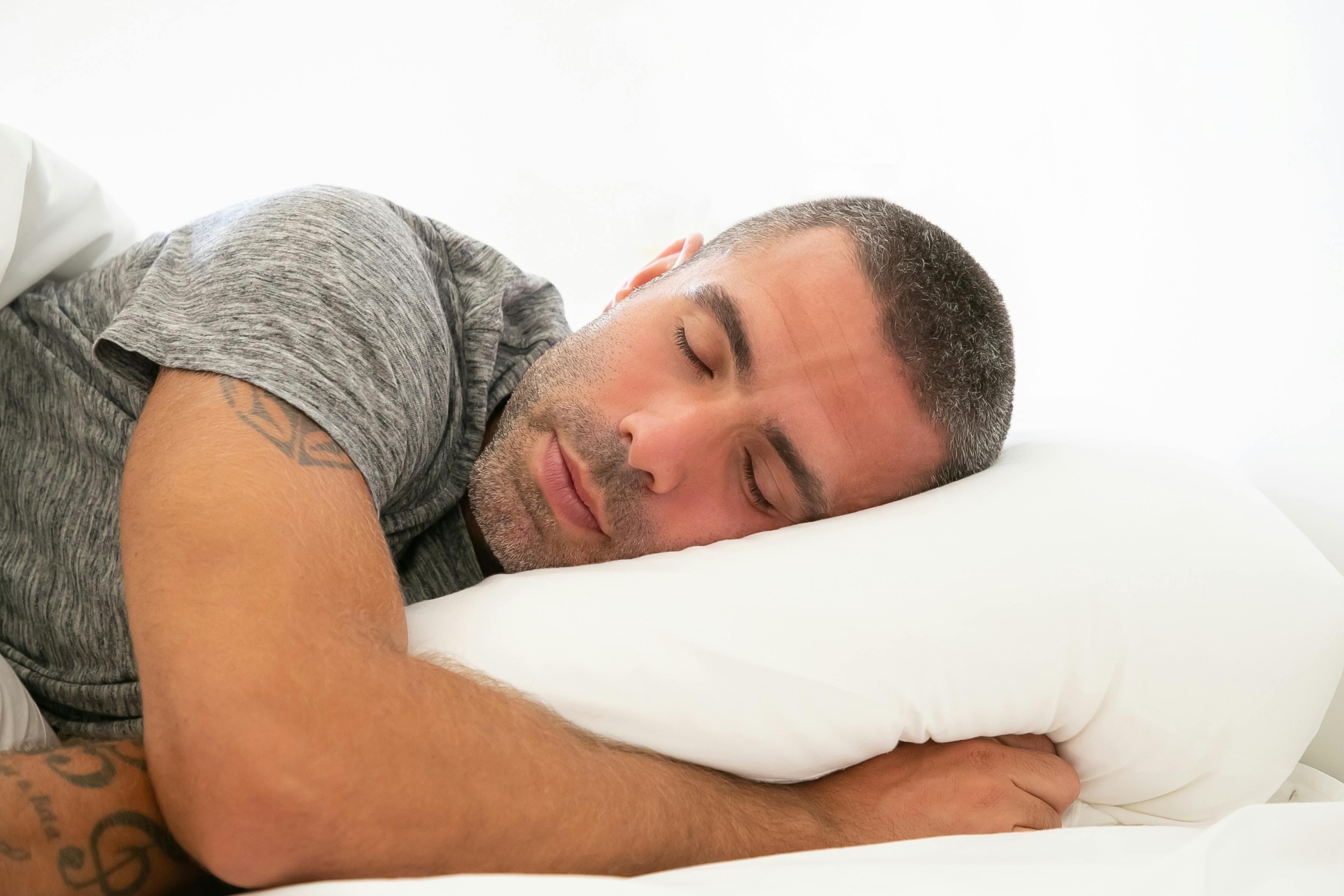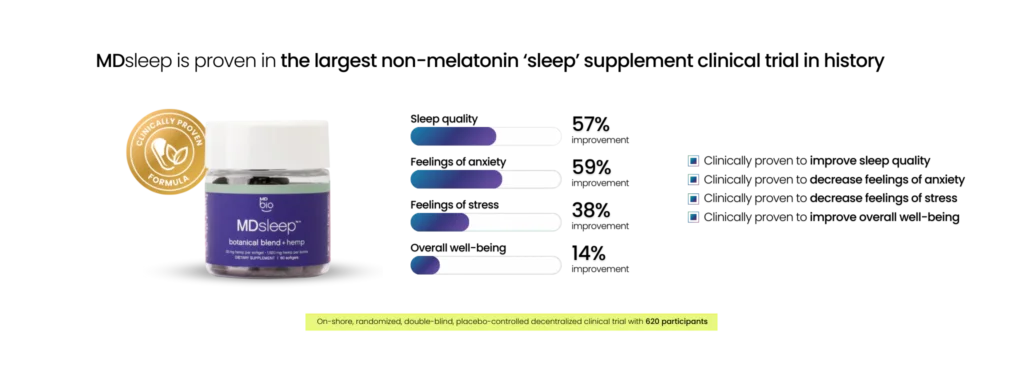

PhotoCredit_Kampus Production_pexels
Struggling to get a good night’s sleep can feel like an endless battle against restlessness and fatigue. Insomnia and other sleep disorders disrupt your body’s natural ability to rest and recover, leaving you drained and unfocused. Without addressing the root cause, these issues can lead to chronic stress, poor health, and reduced quality of life. In this article, we’ll explore how GABA can promote relaxation and improve sleep and how MDSleep sleep aids, with GABA properties, can help manage insomnia or other sleep disorders effectively.
Understanding GABA and Its Role in Sleep
GABA, or Gamma-Aminobutyric Acid, promotes restful sleep by regulating brain activity and reducing neuronal excitability. It primarily functions as an inhibitory neurotransmitter, creating a calming effect that can ease the transition into sleep.
GABA Calms Your Brain’s Receptors
GABA is pivotal in moderating the central nervous system by binding to specific receptors in the brain. These receptors, when activated, enhance the opening of chloride channels, leading to a hyperpolarized state. This process reduces neuron firing rates and diminishes excessive brain activity.
Through this calming effect, individuals often experience reduced anxiety and stress, which are common impediments to falling asleep. By maintaining balanced neurotransmitter levels, GABA helps achieve and sustain a state of relaxation, facilitating natural sleep cycles.
GABA’s Mechanism of Action
The mechanism of GABA’s action involves its unique binding to GABA-A receptors, leading to increased neurotransmitter inhibition. This action counterbalances excitatory neurotransmitters, notably glutamate, in the brain. The inhibitory effect promotes relaxation and induces a sedative state that is beneficial for sleep.
The research underscores the significance of GABA in insomnia treatment, indicating its role in reducing sleep latency and improving sleep quality. GABA fosters a conducive environment for natural sleep patterns by decreasing overall neural activity.
Individuals seeking assistance for sleep challenges may explore GABA supplements, acknowledging the nuances and potential benefits highlighted in studies such as those mentioned by Sleep doctors on how GABA works.
Benefits of GABA for Sleep
GABA is a neurotransmitter known for its calming effects, potentially aiding sleep quality and reducing the time it takes to fall asleep. It also influences sleep architecture by promoting relaxation in the brain.
Improvement in Sleep Quality
GABA supplements are often used to improve the quality of sleep. Users report enhanced overall sleep depth, with fewer interruptions throughout the night. Studies suggest increased GABA activity can lead to more restful sleep by calming neural activity.
The ability of GABA to promote relaxation might help reduce the incidence of sleep disruptions, enhancing the restorative effects of sleep. This is particularly beneficial for those suffering from stress-related sleep issues.
Reduction in Sleep Latency
One noted benefit of GABA is its potential to shorten sleep latency, the time individuals transition from wakefulness to sleep. GABA calms hyperactive neural circuits that can keep people awake at night. This calming effect makes it easier for individuals to fall asleep more quickly.
GABA supplements offer relief by fostering a smoother transition to sleep for people who typically struggle with long periods of wakefulness before sleep. This could be particularly useful for those with difficulty unwinding before bed.
Impact on Sleep Architecture
GABA may play a role in influencing sleep architecture by affecting the different phases of sleep. Enhanced GABA levels are associated with the production of alpha brain waves, which contribute to relaxation. This alteration in brain wave patterns facilitates the onset of deep sleep stages.
While more research is needed, preliminary studies indicate that GABA supplementation may positively impact the distribution of various sleep stages. This can promote a more balanced and restorative sleep cycle, which is essential for mental and physical health. Considerable interest surrounds this topic as individuals seek to optimize their sleep patterns.

Dosage and Safety Considerations
Understanding the appropriate dosage and potential interactions when considering GABA for sleep enhancement. It’s essential to recognize how GABA interacts with other medications and explore safe combinations in clinically proven formulas like MDsleep.
GABA Doses for Sleep
Determining the correct dosage of GABA is critical for its effectiveness in sleep support. Standard dosages range from 100 to 200 milligrams, as these levels are frequently studied. Larger doses may not necessarily increase benefits and could lead to unwanted side effects.
It is advisable to start with the lower end of the dosage spectrum and gradually increase, if needed, under professional guidance. This method helps mitigate potential adverse reactions.
Interactions With Other Medications
GABA may interact with certain medications, affecting their efficacy or increasing side effects. For example, combining GABA with other central nervous system depressants, such as benzodiazepines or alcohol, might lead to increased sedation or drowsiness. It’s essential to consult with a healthcare provider before starting GABA, especially if you are currently taking other medications, to ensure safety and prevent adverse interactions.
Safe Combination of GABA in a Clinically Proven Formula MDsleep
MDsleep features a clinically validated combination, providing a safe approach to using GABA for sleep. This formula is designed to optimize sleep quality without adverse effects. The product combines GABA with other sleep-supporting ingredients, enhancing its efficacy while maintaining a strong safety profile. The synergy between these ingredients helps users achieve a restful night’s sleep.
Ingredient List of the Clinically Proven Formula MDsleep +hemp
MDsleep +hemp includes the following ingredients: GABA, L-theanine, melatonin, valerian root, and hemp extract. Each component is chosen for its ability to promote relaxation and improve sleep quality. GABA functions as a calming agent, while L-theanine supports relaxation. Valerian root reduces anxiety, and hemp extract enhances overall tranquility.
MDsleep hemp+ Key Ingredients List
- Full Spectrum Hemp Complex with CBD and CBN
- Valerian Root
- GABA
- L-Theanine
- Hops
Ingredient List of the Clinically Proven Formula MDsleep Botanical Version (Hemp Free)
The hemp-free version of MDsleep Botanical contains GABA, L-theanine, melatonin, and valerian root. This formulation is designed for those seeking a botanical approach without hemp. GABA and L-theanine support relaxation, melatonin aids in sleep-cycle regulation, and valerian root helps decrease stress and anxiety. This version maintains efficacy while catering to specific user preferences.
MDsleep Botanical Key Ingredients List
- Valerian Root
- GABA
- L-Theanine
- Hops
- Rest Complex™– our proprietary blend of nervine herbs, including lemon balm, chamomile, and passionflower that calms the central nervous system.
Bio-Terpene Complex™ –our proprietary blend of botanicals, including Hops, Valerian Root, and Terpene oil, to help boost GABA and serotonin levels while sedative affecting the body’s central nervous system.
Shop MDsleep
Find sleep aids that were designed by doctors and validated by research.
GABA Supplementation Forms
GABA supplements are available in several forms, each offering different advantages depending on personal preferences and needs. Capsules, powders, and natural sources allow individuals to incorporate GABA into their wellness routines.
Pills and Capsules
Capsules and pills are popular forms of GABA supplementation. They provide a convenient and precise way to ingest GABA, with each unit containing a specified dosage. This form is ideal for people who prefer minimal preparation.
Capsules are often designed for easy swallowing and quick dissolution, making them a practical choice for daily use. These forms ensure controlled intake, usually providing a steady release of GABA.
For those considering GABA supplements, it’s important to note that these products may vary in concentration and additional ingredients. Consulting with a healthcare provider can help determine the appropriate dosage.
Powders
Powdered GABA supplements offer flexibility in how they can be consumed. They can be easily mixed into drinks or food, allowing individuals to customize their intake. This form is suitable for those who prefer a more personalized approach to supplementation.
One of the advantages of powders is the ability to adjust serving sizes. This can be especially helpful for individuals experimenting with different dosages to meet their needs. Users should ensure that they use accurate measuring tools. Some powders may also contain additional flavorings or other substances. Checking labels for these can help consumers make informed choices.
Natural Sources
Natural sources of GABA include certain foods that contain this neurotransmitter or promote its production in the body. Fermented foods such as kimchi, miso, and tempeh are known to have high GABA content.
Additionally, teas like green or oolong may help increase GABA levels due to their amino acid content. These options are ideal for those seeking a dietary approach to enhance GABA intake without supplements.
Exploring natural dietary sources can be an appealing and holistic method for people looking for alternatives to synthetic forms. However, the GABA content in natural sources may vary, so incorporating a variety of these foods can be beneficial.
GABA and Sleep Disorders
GABA regulates various sleep disorders by influencing the central nervous system’s inhibitory processes. These effects are particularly significant in conditions like insomnia and anxiety-related sleep disturbances.
Insomnia and GABA
Insomnia, a common sleep disorder, is often linked to insufficient levels of GABA in the brain. Studies indicate that those with insomnia typically have lower GABA levels compared to individuals without sleep issues. This neurotransmitter is essential for promoting relaxation and a restful night’s sleep.
GABA(A) receptors are critical in this context, as their activation helps promote sleep. The modulation of these receptors can alleviate insomnia symptoms by normalizing the sleep-wake cycle. Pharmacological treatments targeting these receptors include various generations of hypnotics, which enhance GABA-mediated inhibition to induce sleepiness and improve sleep quality.
Anxiety-Related Sleep Issues
Anxiety disorders can significantly disrupt sleep due to heightened levels of arousal and stress, which GABA can help moderate. By enhancing GABA activity, the body is better able to relax, facilitating both falling asleep and maintaining sleep. This function is crucial for individuals with anxiety-related sleep disruptions.
GABA supplements, available over-the-counter, are sometimes used to bolster natural GABA levels in the body, aiming to improve mood and sleep quality. Enhancing GABA function can contribute to a more stable emotional state, reducing the physiological and psychological barriers to achieving restful sleep. This is beneficial for those who experience anxiety-driven sleep challenges, enabling them to achieve more consistent and restorative rest.
GABA and Circadian Rhythms
GABA, a key neurotransmitter in the brain, plays a significant role in regulating circadian rhythms. These rhythms govern various biological processes, including the sleep-wake cycle. The central circadian clock in mammals is located in the hypothalamus’s suprachiasmatic nucleus (SCN). Here, GABA helps synchronize neuronal activity to maintain steady circadian outputs. This process is crucial for preserving sleep rhythms. Research indicates GABAergic mechanisms within the SCN are essential for refining circadian outputs. For example, the inhibitory effects of GABA B receptor agonists can vary significantly between day and night. This suggests that GABA B receptors have rhythmic functions in the SCN.
Disruption in GABA signaling can affect circadian rhythms, inducing changes like burst firing in neurons. Studies have shown that a deficiency in GABA can impact the rhythmic behavior of the SCN, affecting spontaneous firing and other cellular activities. Moreover, GABA supplementation has been observed to promote sleep by modulating serotonin and melatonin levels. This highlights its importance in circadian regulation and its potential therapeutic role in treating disorders such as insomnia. For more details on how GABA influences the central circadian clock, refer to the study on the mechanisms in the SCN. Additionally, the GABAergic system’s role in sleep offers further insights into these complex interactions.
Current Research on GABA and Sleep
Gamma-aminobutyric acid (GABA) is the primary inhibitory neurotransmitter in the central nervous system. Research indicates its significant role in sleep regulation. Recent studies explore how GABA influences the early stages of sleep. In recent studies, GABA was noted for its rapid absorption, reaching peak blood levels approximately 30 minutes post-oral administration. This fast action could be linked to its efficacy in enhancing sleep onset. Investigations show that GABA positively affects early sleep stages, especially when its levels remain elevated in the bloodstream. The dosage of GABA appears crucial for its sleep-inducing effects. Recent findings suggest doses between 100 and 300 mg of biosynthetic GABA are necessary for enhancing sleep. This contrasts with lower doses required for its stress-reducing properties.
Another area of interest is the interaction between GABA and sleep-promoting neurons. The hypothalamus utilizes GABA to inhibit wakefulness-promoting regions, indicating its vital role in sleep onset mechanisms. Current research focuses on developing GABA receptor agonists for insomnia treatment to maximize its therapeutic potential. The role of GABA is explored alongside other compounds like melatonin. Melatonin aids AD patients in entering REM sleep quickly by modulating GABA receptors, highlighting a synergistic relationship between these compounds in sleep regulation. The insights gained from ongoing research continue to contribute valuable knowledge to understanding GABA’s role in sleep.
GABA Interactions with Prescription Sleep Aids
GABA, or Gamma-Aminobutyric Acid, is a neurotransmitter that helps reduce neuronal activity and promotes relaxation. This calming effect makes GABA a common component in some sleep aids. Prescription sleep aids, such as zolpidem (Ambien), eszopiclone (Lunesta), and zaleplon (Sonata), often work by enhancing the effects of GABA. These aids can help with sleep onset and maintenance by amplifying GABA’s calming influence on the brain. While effective, these medications carry risks. They may lead to dependence and side effects like daytime drowsiness and cognitive impairment. Combining these drugs with GABA supplements may amplify the intended impacts but also the side effects, leading to excessive sleepiness or impaired thinking.
It’s crucial to use caution when combining GABA supplements with prescription sleep aids. The interaction between them can intensify their effects, making it essential for users to consult healthcare providers before mixing these substances. This step helps ensure safe and effective use. In addition to prescription medications, GABA supplements might interact with other drugs and supplements. Blood pressure medications should be used with caution alongside GABA, as the combination might have unexpected effects.Understanding these interactions is key to using GABA for sleep safely and effectively. Users should consult healthcare professionals to prevent adverse effects and ensure safe combinations. This precaution is vital for individuals taking prescription sleep aids.
Frequently Asked Questions
GABA is often used as a supplement to improve sleep quality. People frequently inquire about its side effects, interaction with other supplements, and comparisons with pharmaceuticals like Xanax.
What are the potential side effects of taking GABA for sleep?
While GABA is generally considered safe, some individuals might experience mild side effects such as headaches, digestive issues, or drowsiness. To ensure personal safety, it is essential to consult a healthcare provider before beginning any new supplement regimen.
How does GABA compare to Xanax for anxiety and sleep?
GABA supplements work naturally to promote relaxation and sleep, whereas Xanax is a prescription medication that treats anxiety and panic disorders by enhancing the effects of GABA in the brain. Unlike Xanax, GABA supplements do not typically carry the risk of dependency.
Should I take GABA and L-theanine together for better sleep, and if so, in what dosages?
Combining GABA and L-theanine can enhance relaxation and improve sleep quality. L-theanine is known for promoting calmness without drowsiness. For dosage, individuals often take 100-200 mg of GABA and 100-400 mg of L-theanine, but it is advisable to consult a healthcare professional for personalized advice.
What is the optimal timing for taking GABA to improve sleep quality?
GABA should be taken 30 to 60 minutes before bedtime to allow it to exert its calming effects as you prepare for sleep. This timing helps facilitate a quicker transition into a restful state, supporting a consistent sleep schedule.
Which GABA supplement is considered the best for aiding in sleep?
The effectiveness of GABA supplements can vary based on individual needs and preferences. Reputable brands often provide high-quality products with verified dosages. Choosing a supplement with positive reviews and third-party testing is advisable to ensure quality.
Are there any adverse long-term effects associated with using GABA for sleep?
Long-term use of GABA supplements is generally considered safe, with no significant adverse effects reported in current research. However, continuous evaluation by a healthcare provider is recommended to monitor any health changes and confirm the ongoing suitability of the supplement for individual use.
Read Next
CBG vs. CBD: Which Is Right for You?
Uncover the distinctions between CBG and CBD, including their mechanisms of action and potential wellness applications. Learn which cannabinoid may best support your sleep and overall health.
Read more
Full Spectrum Hemp: Benefits and Uses
Explore the advantages of full-spectrum hemp, including its diverse cannabinoid profile and potential for promoting better sleep and relaxation. Learn how the “entourage effect” may enhance the efficacy of hemp-based sleep aids.
Read more
CBN vs. CBD: Comparing Sleep Benefits
Discover how CBN and CBD differ in their origins, effects, and potential for improving sleep. This article covers their unique properties, legal status, and which might be better suited for your sleep needs.
Read more
CBN for Sleep: How Cannabinol Can Help
Delve into the science behind CBN as a sleep aid, including its sedative properties and how it interacts with your body’s endocannabinoid system. Find information on dosing, benefits, and considerations for using CBN to improve sleep.
Read more
THC for Sleep: Effects and Proper Dose
Learn how THC influences sleep patterns, its potential benefits and risks, and how to determine the right dosage for restful nights. This article provides expert guidance on using THC safely for sleep support.
Read more
CBN vs. CBD vs. CBG: A Comprehensive Guide
Compare CBN, CBD, and CBG side by side to see how each cannabinoid affects sleep, pain, and anxiety. Find out which may offer the most benefits for your wellness routine.
Read more
CBG vs. CBN: Which Cannabinoid Is Better for Sleep?
Explore the differences between CBG and CBN, two non-psychoactive cannabinoids, and learn how each may impact energy, focus, and sleep quality. This guide discusses their unique effects, benefits, and best uses for rest and relaxation.
Read more

Kia Michel, MD
Physician
Kia Michel, MD is an urologist and staff surgeon at Cedars-Sanai Medical Center in Los Angeles. As a founding member of Comprehensive Urology in Beverly Hills, he believes in treating all aspects of a patient’s wellbeing in order to achieve optimal health. After 25 years in private practice, Dr. Michel believes that a good night’s sleep is essential to maintaining your health, which inspired him to co-create the MDsleep community and the Sleep Doctors Blog.
What Our Readers Say
“Thanks to the insightful articles, I’ve finally managed to get back to my old sleep routine. I feel more rested and energetic each day!”
“The blog’s advice on sleep hygiene has been a game-changer for me. I never realized how small changes could make such a big difference.”
“I struggled with insomnia for years, but the tips I found here have helped me sleep through the night consistently. Thank you!”
“I no longer feel like a zombie from The Walking Dead series! I finally have my life back.”
Stay Updated with Our Newsletter
Join our community of sleep enthusiasts! Subscribe to receive the latest blog posts and exclusive sleep tips straight to your inbox.
Follow Us for More Sleep Insights
Discover Better Sleep Solutions
Unlock the secrets to a restful night by exploring our expert-backed articles and join our vibrant community for personalized sleep tips.
List of References
- AASM Sleep Prioritization Survey: This survey by the American Academy of Sleep Medicine examines the use of melatonin among the public. It reveals trends and insights into how melatonin influences sleep patterns. For more information, visit AASM Sleep Prioritization Survey, Melatonin Use.
- Melatonin Overview: The A.D.A.M. Medical Encyclopedia provides a detailed entry on melatonin, discussing its role as a natural hormone and its applications in treating sleep disorders. More details can be found at Melatonin – MedlinePlus.
- Cannabinoids and Sleep: A study by Kaul, Zee, and Sahni reviews the effects of cannabinoids on sleep and their potential therapeutic roles in managing sleep disorders. This research can be accessed through Neurotherapeutics.
- Insomnia and Substance Use Disorders: Arnedt discusses insomnia in individuals with substance use disorders, highlighting how these conditions interact. This information is available in UpToDate at Insomnia in Patients with a Substance Use Disorder.
- Clinical Trials of Cannabinoids: Kuhathasan et al. provide a critical review focusing on clinical trials that investigate cannabinoids for sleep improvement. For full access, check Experimental and Clinical Psychopharmacology.
- Cannabis and Sleep Literature Review: Babson, Sottile, and Morabito explore the relationship between cannabis, cannabinoids, and sleep through a literature review. Find their findings in Current Psychiatry Reports.
- Cannabidiol (CBD) Information: This entry from the A.D.A.M. Medical Encyclopedia details CBD, a compound from cannabis known for its potential benefits in sleep enhancement. More information is at Cannabidiol (CBD) – MedlinePlus.
- Magnesium for Insomnia: A systematic review and meta-analysis by Mah and Pitre investigates the impact of oral magnesium supplementation on insomnia in older adults. Read about it in BMC Complementary Medicine and Therapies.
- Dietary Magnesium: The A.D.A.M. Medical Encyclopedia discusses the role of magnesium in diet, emphasizing its importance for sleep and overall health. Further details are provided at Magnesium in Diet – MedlinePlus.
- Safe Natural Sleep Aids: Rao et al. investigate various natural sleep aids available in the market, searching for effective options for sleep improvement. The study is accessible at Journal of the American College of Nutrition.
- Theanine’s Effect on Sleep: Baba and colleagues explore how theanine influences sleep quality, particularly in young women affected by caffeine-induced wakefulness. More can be found in Food & Function.
- Theanine Complex and Sleep Quality: Research by Dasdelen et al. presents findings on a novel theanine complex that improves sleep quality. It is published in Frontiers in Nutrition.
- Glycine and Sleep: Kawai et al. study the effects of glycine on sleep and the brain, focusing on how it may assist with sleep disorders. Details can be found at Neuropsychopharmacology.
- Valerian Root Information: Shane-McWhorter provides insights into valerian as a natural sleep aid, detailing its usage and effects in the Merck Manual. Visit Valerian – Merck Manual Professional Version.

